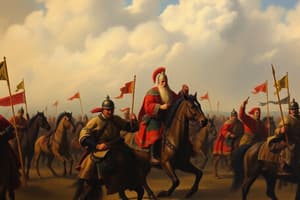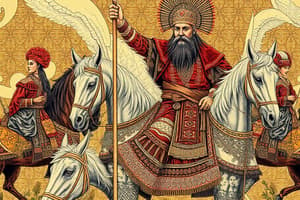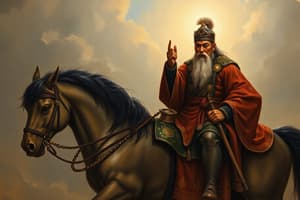Podcast
Questions and Answers
What does the term 'Mongols' refer to?
What does the term 'Mongols' refer to?
- A style of architecture
- A type of weapon
- People from Central Asia (correct)
- A historical empire in Europe
What title was given to Mongol leaders?
What title was given to Mongol leaders?
Khan
What is a Kuriltai?
What is a Kuriltai?
Meeting of all Mongol chieftains
Who was Genghis Khan?
Who was Genghis Khan?
What were the Jurchens known for?
What were the Jurchens known for?
What were Khanites?
What were Khanites?
Which empire did Khan attack and conquer in 1219?
Which empire did Khan attack and conquer in 1219?
What was the Pax Mongolica?
What was the Pax Mongolica?
What was the capital of the Mongol Empire under Chinggis Khan?
What was the capital of the Mongol Empire under Chinggis Khan?
Who was Ogodei?
Who was Ogodei?
What was the Golden Horde?
What was the Golden Horde?
Who defeated the Mongols at the Battle of Kulikovo?
Who defeated the Mongols at the Battle of Kulikovo?
Who was Kublai Khan?
Who was Kublai Khan?
What was the Yuan Dynasty?
What was the Yuan Dynasty?
What is a Yurt?
What is a Yurt?
What does 'tumens' refer to?
What does 'tumens' refer to?
What were siege weapons used for?
What were siege weapons used for?
Who was Marco Polo?
Who was Marco Polo?
Flashcards are hidden until you start studying
Study Notes
Mongol Empire Overview
- Mongols originated from Central Asia, creating the largest single land empire in history upon unification.
- The term "Khan" translates to "supreme ruler" and was designated to Mongol leaders.
Key Meetings and Leadership
- The Kuriltai was a significant assembly where Mongol chieftains convened to choose their supreme leader.
- Genghis Khan, born Temujin, was instrumental in uniting Mongol tribes and forming an unstoppable military force, officially establishing the vast empire.
Conquest and Expansion
- The Jurchens founded the Qin kingdom, succeeding the Liao dynasty in northern China, and pushed the Song dynasty southward.
- The Mongol Empire was segmented into districts known as Khanites.
- Khan launched military campaigns against the Kara Khitai Empire and the Khwarazm Empire in 1219, successfully conquering both.
Era of Stability
- Pax Mongolica refers to a period of peace and relative stability under Mongol rule.
- Karakorum served as the capital of the Mongol Empire during Genghis Khan's reign.
Key Locations and Events
- The Tangut Empire, located south of the Gobi Desert, was where Genghis Khan passed away.
- Ogodei, Genghis Khan's favorite son, succeeded him as the ruler.
- Batu, a grandson of Genghis Khan, governed the Golden Horde and initiated the invasion of Russia in 1236.
Historical Battles and Resistance
- Sarai emerged as Batu's new capital along the Volga River.
- The Golden Horde was a Mongolian force that extended across eastern Europe in the 13th century.
- The Battle of Kulikovo in 1380 marked the Mongols' first significant defeat against Moscow.
Successors and Territories
- Hulegu, another grandson of Genghis Khan, led the Ilkhanate and was responsible for the destruction of Abbasid Baghdad.
- Baibars, a Mameluk commander, achieved significant victories against the Mongols.
Governance in China
- The Il-Khanate ruled over Iran (Persia) and the broader Middle East region.
- Kublai Khan, a grandson of Genghis Khan, focused on the conquest of China and established the Yuan Dynasty, which lasted from 1279 to 1368, with Dadu (modern Beijing) as the capital.
Resistance Against Mongol Rule
- The White Lotus Society formed as a secretive group aimed at overthrowing the Yuan Dynasty, epitomizing peasant resistance to Mongol authority.
- Zhu Yuanzhang, a Buddhist monk, successfully led a rebellion against the Mongols, founding the Ming Dynasty thereafter.
Geography and Culture
- The Gobi Desert, one of the world's largest deserts, spans parts of modern-day China and Mongolia.
- Nomads of Central Asia traditionally lived in yurts, portable tents suited for their lifestyle.
- Tumens served as the essential fighting units within the Mongol military forces, equipped with innovative siege weapons for attacking fortifications.
Literature and Exploration
- "The Romance of the West Chamber" is a notable Chinese drama from the Yuan period, reflecting the culture of the time.
- Marco Polo, an Italian explorer, documented his travels to Central Asia and China, providing valuable insights into Mongol rule and its vast empire.
Studying That Suits You
Use AI to generate personalized quizzes and flashcards to suit your learning preferences.




